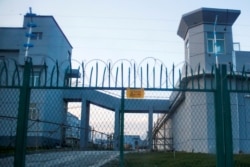As part of the Biden administration's efforts to infuse human rights into its foreign policy, the U.S. State Department on Friday designated 12 government officials from Uganda, China, Belarus, Bangladesh, Sri Lanka and Mexico for "gross violations of human rights," according to Secretary of State Antony Blinken.
Seventy-three years after the United Nations adopted the Universal Declaration of Human Rights on December 10, 1948, the department's commemoration of Human Rights Day targeted people like Mario Plutarco Marin Torres, a former Mexican governor charged with jailing and torturing journalist Lydia Cacho in 2005. Another official, Ugandan military intelligence chief Abel Kandiho, is no longer welcome in the United States after allegedly allowing his deputies to arrest and abuse people at odds with the Ugandan government.
"We are determined to put human rights at the center of our foreign policy, and we reaffirm this commitment by using appropriate tools and authorities to draw attention to and promote accountability for human rights violations and abuses, no matter where they occur," Blinken said.
Under the congressionally approved foreign operations bill that funds the State Department, the secretary of state can bar foreign government officials and their close family members from entering the United States if they have been involved with corruption or human rights abuses.
Four current and former Chinese officials — Shohrat Zakir, Erken Tuniyaz, Hu Lianhe and Chen Mingguo — also made the list for their connection to Beijing's repression of Uyghurs in the Xinjiang region.
“The U.S. practice constitutes serious interference in China's internal affairs, severe violation of basic norms governing international relations, and grave harm to China-U.S. relations,” Chinese Embassy spokesperson Liu Pengyu said in response to a VOA request for comment about the sanctions. “China firmly opposes and strongly condemns that.”
Besides the State Department's designations, the Treasury Department has sanctioned 25 individuals and entities under the Global Magnitsky Human Rights Accountability Act. A statement published Friday outlined sweeping sanctions on people and organizations in China, Bangladesh, North Korea and Burma, as well as a Russian university and its provost for sponsoring visas for "hundreds" of construction workers tied to Pyongyang's nuclear program.
One batch of sanctions targets a company invested in surveillance technologies used in Xinjiang; another targets the Rapid Action Battalion, a Bangladeshi task force that "[undermines] the rule of law and respect for human rights and fundamental freedoms," according to the department's statement.
One Bangladeshi official and two Chinese officials designated by the State Department also appeared on the Treasury Department's sanctions list.
“Xinjiang-related issues are never about human rights, ethnicity or religion,” Liu said. “Xinjiang affairs are entirely China's internal affairs. The U.S. has no right and is in no position to intervene.”
"On International Human Rights Day, Treasury is using its tools to expose and hold accountable perpetrators of serious human rights abuse," said Wally Adeyemo, the department's deputy secretary. "Our actions today, particularly those in partnership with the United Kingdom and Canada, send a message that democracies around the world will act against those who abuse the power of the state to inflict suffering and repression."
Washington's interagency actions join other efforts by the United Kingdom and Canada on Friday to sanction Burmese military officials involved in the country's February coup, as well as a joint initiative by the European Union, Canada, the United States and the United Kingdom last week to sanction Belarusian strongman Alexander Lukashenko.
"The United States looks forward to continuing our partnerships with allies, partners and civil society alike in defending human rights and promoting accountability and good governance," Blinken said in Friday's statement.
Reporter Christy Lee of VOA’s Korean Service contributed to this report.






